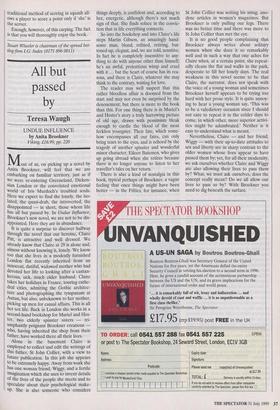All but passed by
Teresa Waugh
UNDUE INFLUENCE by Anita Brookner Viking, £16.99, pp. 220 ost of us, on picking up a novel by Anita Brookner, will feel that we are embarking on familiar territory, just as if we were re-entering Greeneland, Dicken- sian London or the convoluted emotional world of Iris Murdoch's troubled souls. Here we expect to find the lonely, the iso- lated, the quasi-drab, the introverted, the disappointed — in short, those whom life has all but passed by. In Undue Influence, Brookner's new novel, we are not to be dis- appointed. Here they are in abundance.
It is quite a surprise to discover halfway through the novel that our heroine, Claire Pitt, is attractive and well dressed. We already know that Claire at 29 is alone and, almost without knowing it, lonely. We know too that she lives in a modestly furnished London flat recently inherited from an innocent, dutiful, widowed mother who had devoted her life to looking after a cantan- kerous, sick, much older husband. Claire takes her holidays in France, touring cathe- dral cities, admiring the Gothic architec- ture and photographing the tympanum at Autun, but also, unbeknown to her mother, picking up men for casual affairs. This is all her sex life. Back in London she works in a second-hand bookshop for Muriel and Hes- ter, two elderly spinster sisters — tri- umphantly poignant Brookner creations who, having inherited the shop from their father, have worked there all their lives.
Alone in the basement Claire is employed to collect and edit the writings of this father, St John Collier, with a view to future publication. In this job she appears to be extremely happy. Away from work she has one woman friend, Wiggy, and a fertile imagination which she uses to invent details of the lives of the people she meets and to speculate about their psychological make- up. She is also someone who considers things deeply, is confident and, according to her, energetic, although there's not much sign of that. She finds solace in the convic- tion that in life everything connects.
So into the bookshop and into Claire's life steps Martin Gibson, an amazingly hand- some man, blond, refined, retiring, but- toned-up, elegant, and, we are told, sensitive. In fact he is completely insensitive to any- thing to do with anyone other than himself; he's an awful, pretentious wimp and cruel with it ... but the heart of course has its rea- sons, and there is Claire, whatever she may think to the contrary, waiting for love.
The reader may well suspect that this rather bloodless affair is doomed from the start and may not even be surprised by the denouement; but there is more to the book than this. For one thing there is in Muriel's and Hester's story a truly harrowing picture of old age, drawn with pessimism bleak enough to curdle the blood of the most feckless youngster. Their fate, which some- how encompasses all our fates, can only bring tears to the eyes, and is echoed by the tragedy of another spinster and wonderful minor character, Eileen Batemen, who gives up going abroad when she retires because there is no longer anyone to listen to her traveller's tales on her return.
There is also a kind of nostalgia in this book, typical perhaps of Brookner, a vague feeling that once things might have been better — in the Fifties, for instance, when St John Collier was writing his smug, ano- dyne articles in women's magazines. But Brooluier is only pulling our legs. There was no better time and there was more to St John Collier than met the eye.
It is no good people complaining that Brookner always writes about solitary women when she does it so remarkably well and in such a way that one aches for Claire when, at a certain point, she repeat- edly cleans the flat and walks in the park, desperate to fill her lonely days. The real weakness in this novel seems to be that Claire, the narrator, does not speak with the voice of a young woman and sometimes Brookner herself appears to be trying too hard with her prose style. It is quite annoy- ing to hear a young woman say, 'This was to be a valedictory occasion since I should not care to repeat it in the colder days to come, in which other, more superior activi- ties might be adumbrated.' Neither is it easy to understand what is meant.
Nevertheless, Claire — and her friend, Wiggy — with their up-to-date attitudes to sex and liberty are in sharp contrast to the older women whose lives appear to have passed them by; yet, for all their modernity, we ask ourselves whether Claire and Wiggy are also allowing their lives to pass them by? What, we must ask ourselves, does the concept really mean? Do we all allow our lives to pass us by? With Brookner you need to dig beneath the surface.


























































 Previous page
Previous page